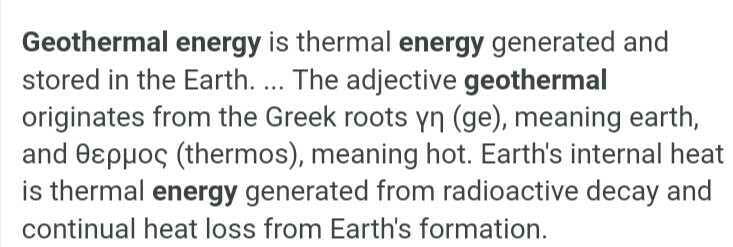Class 8 Exam > Class 8 Questions > What is Geothermal energy?
Start Learning for Free
What is Geothermal energy?
Community Answer
What is Geothermal energy?
Geothermal Energy
Geothermal energy is a renewable energy source that harnesses the natural heat from the Earth's core to generate electricity. This energy is produced by the decay of radioactive isotopes in the Earth's mantle and crust. Geothermal energy is a reliable and sustainable source of energy that can be used to power homes, businesses, and entire communities. Here’s how it works:
How it works
Geothermal energy is generated by drilling deep into the Earth's crust to access hot water and steam. The heat from the Earth's core heats up the water, creating steam that rises to the surface. This steam is then used to power turbines, which generate electricity. The water that is used to create the steam is then condensed and returned to the Earth, where it is heated up again and the process is repeated.
Types of Geothermal Energy
There are two main types of geothermal energy:
- Hot Rock Geothermal Energy: This type of geothermal energy is generated by drilling deep into the Earth's crust to access hot rocks. Water is then pumped into the borehole, where it is heated by the rocks and turned into steam. The steam is then used to power turbines, which generate electricity.
- Hot Water Geothermal Energy: This type of geothermal energy is generated by drilling deep into the Earth's crust to access hot water. The hot water is then pumped to the surface, where it is used to power turbines that generate electricity.
Advantages of Geothermal Energy
There are several advantages to using geothermal energy:
- Renewable: Geothermal energy is a renewable energy source, which means that it will never run out.
- Reliable: Geothermal energy is a reliable source of energy that can be used to power homes, businesses, and entire communities.
- Sustainable: Geothermal energy is a sustainable source of energy that does not produce greenhouse gas emissions.
- Cost-effective: Geothermal energy is a cost-effective source of energy that can help to reduce energy costs.
Disadvantages of Geothermal Energy
There are also some disadvantages to using geothermal energy:
- Location-specific: Geothermal energy can only be generated in certain locations where there is access to hot water or hot rocks.
- High upfront costs: The upfront costs of drilling and building a geothermal power plant can be high.
- Environmental impact: Geothermal energy can have an environmental impact, as it can release trace amounts of greenhouse gases and other pollutants.
Conclusion
Geothermal energy is a reliable and sustainable source of energy that can be used to power homes, businesses, and entire communities. While there are some disadvantages to using geothermal energy, the advantages outweigh the disadvantages, making it a viable source of renewable energy for the future.
Attention Class 8 Students!
To make sure you are not studying endlessly, EduRev has designed Class 8 study material, with Structured Courses, Videos, & Test Series. Plus get personalized analysis, doubt solving and improvement plans to achieve a great score in Class 8.

|
Explore Courses for Class 8 exam
|

|
Similar Class 8 Doubts
What is Geothermal energy?
Question Description
What is Geothermal energy? for Class 8 2024 is part of Class 8 preparation. The Question and answers have been prepared according to the Class 8 exam syllabus. Information about What is Geothermal energy? covers all topics & solutions for Class 8 2024 Exam. Find important definitions, questions, meanings, examples, exercises and tests below for What is Geothermal energy?.
What is Geothermal energy? for Class 8 2024 is part of Class 8 preparation. The Question and answers have been prepared according to the Class 8 exam syllabus. Information about What is Geothermal energy? covers all topics & solutions for Class 8 2024 Exam. Find important definitions, questions, meanings, examples, exercises and tests below for What is Geothermal energy?.
Solutions for What is Geothermal energy? in English & in Hindi are available as part of our courses for Class 8.
Download more important topics, notes, lectures and mock test series for Class 8 Exam by signing up for free.
Here you can find the meaning of What is Geothermal energy? defined & explained in the simplest way possible. Besides giving the explanation of
What is Geothermal energy?, a detailed solution for What is Geothermal energy? has been provided alongside types of What is Geothermal energy? theory, EduRev gives you an
ample number of questions to practice What is Geothermal energy? tests, examples and also practice Class 8 tests.

|
Explore Courses for Class 8 exam
|

|
Suggested Free Tests
Signup for Free!
Signup to see your scores go up within 7 days! Learn & Practice with 1000+ FREE Notes, Videos & Tests.


























